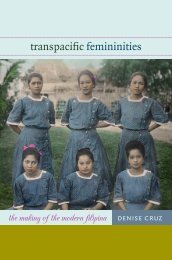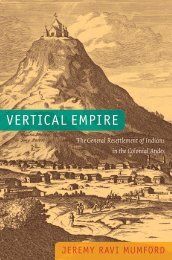Spring 2013 Catalog - Duke University Press
Spring 2013 Catalog - Duke University Press
Spring 2013 Catalog - Duke University Press
You also want an ePaper? Increase the reach of your titles
YUMPU automatically turns print PDFs into web optimized ePapers that Google loves.
Speaking of Flowers<br />
Student Movements and the Making and<br />
Remembering of 1968 in Military Brazil<br />
victoria langland<br />
“Clear, concise, and full of engaging and dramatic stories, Victoria<br />
Langland’s Speaking of Flowers is an important contribution to our under-<br />
standing of the history of the Brazilian student movement and its vital role<br />
in twentieth-century politics. In addition, through her analysis of the<br />
constructed memories of 1968, Langland provides readers an excellent<br />
opportunity to consider a series of methodological questions about how<br />
history is written and how Brazilians have shaped the recollection of<br />
that history.”—JAMES N. GREEN, author of We Cannot Remain Silent:<br />
Opposition to the Brazilian Military Dictatorship in the United States<br />
Speaking of Flowers<br />
is an innovative study<br />
of student activism<br />
during Brazil’s military<br />
dictatorship (1964–85)<br />
and an examination<br />
of the very notion of<br />
student activism, which<br />
changed dramatically<br />
in response to the<br />
Volunteer pallbearers carry Edson Luis’s coffin to the João student protests of<br />
Batista cemetery in a funeral directed and controlled by<br />
students. Correio da Manhã collection, Arquivo Nacional. 1968. Looking into what<br />
made students engage<br />
in national political affairs as students, rather than through other<br />
means, Victoria Langland traces a gradual, uneven shift in how they<br />
constructed, defended, and redefined their right to political participation,<br />
from emphasizing class, race, and gender privileges to organizing<br />
around other institutional and symbolic forms of political authority.<br />
Embodying Cold War political and gendered tensions, Brazil’s increasingly<br />
violent military government mounted fierce challenges to student<br />
political activity just as students were beginning to see themselves<br />
as representing an otherwise demobilized civil society. By challenging<br />
the students’ political legitimacy at a pivotal moment, the dictatorship<br />
helped to ignite the student protests that exploded in 1968. In her<br />
attentive exploration of the years after 1968, Langland analyzes what<br />
the demonstrations of that year meant to later generations of Brazilian<br />
students, revealing how student activists mobilized collective memories<br />
in their subsequent political struggles.<br />
Victoria Langland is Assistant Professor of History at the <strong>University</strong> of<br />
California, Davis.<br />
LATIN AMERICAN HISTORY/SOCIAL MOVEMENTS<br />
June 352 pages, 32 photographs<br />
paper, 978–0–8223–5312–6, $24.95/£16.99<br />
cloth, 978–0–8223–5298–3, $89.95/£67.00<br />
latin american / caribbean studies<br />
Singing for the Dead<br />
The Politics of Indigenous Revival in Mexico<br />
paja faudree<br />
“Singing for the Dead makes major theoretical and ethnographic contributions<br />
to studies of indigenous literacy, ethnic revival movements, and the<br />
ways in which politics functions through cultural forms. The book is historically<br />
and theoretically rich, situating the different examples of ethnic<br />
revival—the Day of the Dead song contest, the Mazatec Indigenous Church,<br />
and the work of indigenous Mazatec writers—in a wonderfully rich context.”<br />
—LYNN STEPHEN, author of Transborder Lives: Indigenous Oaxacans in<br />
Mexico, California, and Oregon<br />
Singing for the Dead chronicles<br />
ethnic revival in Oaxaca, Mexico,<br />
where new forms of singing<br />
and writing in the local Mazatec<br />
indigenous language are producing<br />
powerful, transformative<br />
political effects. Paja Faudree<br />
argues for the inclusion of singing<br />
as a necessary component<br />
in the polarized debates about<br />
indigenous orality and literacy<br />
and considers how the coupling<br />
of literacy and song has allowed<br />
people from the region to create<br />
texts of enduring social resonance.<br />
She examines how local<br />
young people are learning to<br />
read and write in Mazatec as<br />
a result of the region’s new Day of the Dead song contest. Faudree also<br />
studies how tourist interest in local psychedelic mushrooms has led<br />
to their commodification, producing both opportunities and challenges<br />
for songwriters and others who represent Mazatec culture. She situates<br />
these revival movements within the contexts of Mexico and Latin<br />
America, as well as the broad, hemisphere-wide movement to create<br />
indigenous literatures. Singing for the Dead provides a new way to think<br />
about the politics of ethnicity, the success of social movements, and the<br />
limits of national belonging.<br />
Day of the Dead observed in the Sierra Mazateca<br />
of Oaxaca, Mexico. Photo by the author.<br />
Paja Faudree is Assistant Professor of Anthropology at Brown <strong>University</strong>.<br />
ANTHROPOLOGY/LATIN AMERICAN STUDIES/INDIGENOUS STUDIES<br />
June 328 pages, 26 illustrations<br />
paper, 978–0–8223–5431–4, $24.95/£16.99<br />
cloth, 978–0–8223–5416–1, $89.95/£67.00<br />
31












